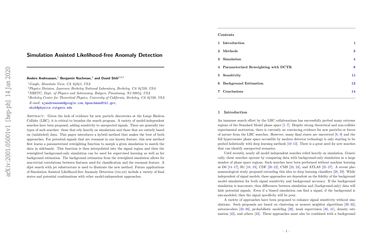Simulation Assisted Likelihood-free Anomaly Detection
Given the lack of evidence for new particle discoveries at the Large Hadron Collider (LHC), it is critical to broaden the search program. A variety of model-independent searches have been proposed, adding sensitivity to unexpected signals. There are generally two types of such searches: those that rely heavily on simulations and those that are entirely based on (unlabeled) data. This paper introduces a hybrid method that makes the best of both approaches. For potential signals that are resonant in one known feature, this new method first learns a parameterized reweighting function to morph a given simulation to match the data in sidebands. This function is then interpolated into the signal region and then the reweighted background-only simulation can be used for supervised learning as well as for background estimation. The background estimation from the reweighted simulation allows for non-trivial correlations between features used for classification and the resonant feature. A dijet search with jet substructure is used to illustrate the new method. Future applications of Simulation Assisted Likelihood-free Anomaly Detection (SALAD) include a variety of final states and potential combinations with other model-independent approaches.
PDF Abstract

